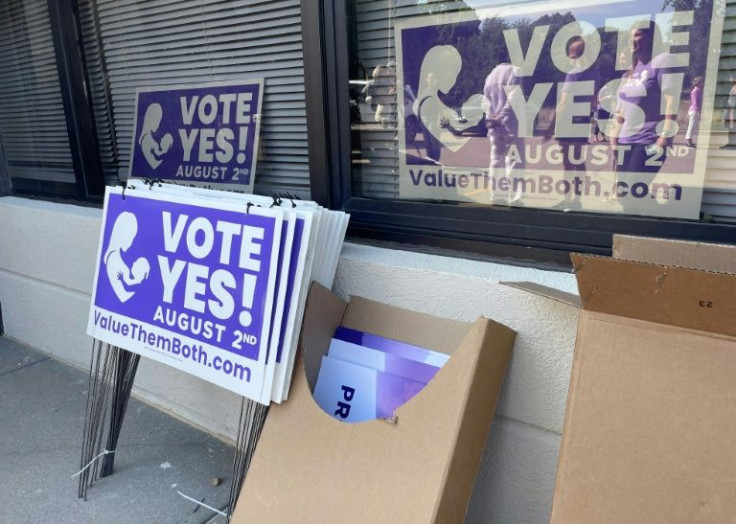Kansas Votes On Abortion Rights In US Test Case
Voters in the Midwestern state of Kansas head to the polls Tuesday in the first major ballot on abortion since the US Supreme Court ended the national right to the procedure in June.
The vote is heavy with consequences for Kansans themselves, who will decide whether to remove the right to an abortion from the traditionally conservative state's constitution.
But it is also being seen as a test case for abortion rights nationwide, as Republican-dominated legislatures rush to impose strict bans on the procedure following the Supreme Court's decision to overturn Roe v. Wade.
Other states including California and Kentucky are set to vote on the issue in November, at the same time as midterm elections to Congress in which both Republicans and Democrats hope to mobilize their supporters nationwide around the question of abortion.

The Kansas ballot centers on a 2019 ruling by the state's supreme court that guarantees access to abortion -- currently up to 22 weeks.
In response, the Republican-dominated state legislature introduced an amendment known as "Value Them Both" that would scrap the constitutional right -- with the stated aim of handing regulation of the procedure back to lawmakers.
But in the opposing camp, activists see the campaign as a barely-masked bid to clear the way for an outright ban -- a conservative state legislator having already introduced a bill that would ban abortion without exceptions for rape, incest, or the life of the mother.
For Ashley All, spokeswoman for pro-abortion rights campaign Kansans for Constitutional Freedom, the amendment would deal a blow to "personal autonomy."

Activists also complain that the phrasing of the ballot question is counterintuitive, and potentially confusing: voting "Yes" to the amendment means abortion rights being curbed, while people who wish to keep those rights intact must vote "No."
Abortion rights advocates in Kansas are looking nervously to neighboring Oklahoma and Missouri which are among at least eight states to have passed near-total bans -- the latter making no exceptions for rape or incest -- while Midwestern Indiana adopted its own rigid ban on Saturday.
Kara Miller Karns, a voter in Leawood, Kansas, said she planned to vote for the status quo on Tuesday, saying it was "not acceptable" for her daughters to grow up with fewer rights than she did.
But in the same neighborhood, 43-year-old Christine Vasquez said she planned to back the constitutional amendment -- in hope it would clear the way for a future vote on an abortion ban.
"I believe that life starts at conception," she told AFP ahead of the ballot.
The outcome in Kansas could mean a boost or a blow to either side of the highly charged US abortion debate -- and the eyes of the nation will be fixed on the state on Tuesday.
Kansas leans heavily toward the Republican party, which favors stricter abortion regulations, but a 2021 survey from Fort Hays State University found that fewer than 20 percent of Kansas respondents agreed that abortion should be illegal even in cases of rape or incest.
© Copyright AFP 2024. All rights reserved.





















